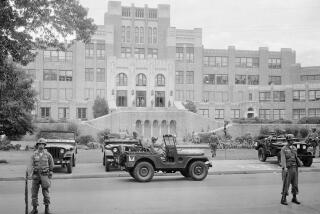Harry Ashmore; Arkansas Editor Fought Segregation
- Share via
Harry S. Ashmore, civil rights writer who won a Pulitzer Prize for his editorials on desegregating Little Rock’s Central High School 40 years ago, has died at the age of 81.
Ashmore, a resident of Santa Barbara since 1960, died in a nursing home there Tuesday from complications of a stroke he suffered Jan. 9.
Rooted in a Southern family, Ashmore was editor of the now-defunct Arkansas Gazette in 1957 when Arkansas Gov. Orval E. Faubus called out the National Guard to bar nine black students from entering Little Rock High School. The crisis ended only after then-President Dwight Eisenhower wrested control of the National Guard from Faubus and sent in federal troops to restore order and enable integration to proceed.
While far from a wholesale endorsement of integration, Ashmore’s editorials lambasted Faubus for engineering the crisis for political ends and urged citizens to accept the Little Rock school board’s desegregation plan that would result “in the admission of only a few, carefully screened Negro students to a single white high school.”
But his words from the lonely middle radically countered the attitude of the Deep South at the time never to permit any integration. His editorials earned him death threats, an advertising boycott and circulation decline.
The Gazette also won two Pulitzers--one for his editorials and one for public service for its general coverage.
“Harry was the central figure in the crisis. He was the leader of the opposition to mob rule, and all of us who opposed Faubus rallied around him,” said Henry Woods, a Little Rock lawyer in the 1950s and now a federal judge. “He stood in the breech and held the walls against the barbarians.”
Conceding that he was never comfortable to be known as either a liberal or integrationist, Ashmore told an interviewer in 1990: “Philosophically, we all knew segregation was wrong, but we weren’t doctrinaire liberals. . . . I tended to laugh more at the absurdity of it all.”
Ashmore was editor of the Gazette from 1948 until 1959 when he moved to Santa Barbara to head the Center for the Study of Democratic Institutions, a private think tank. The paper ceased to exist in 1991.
Author of 11 books, Ashmore detailed his career as racial issue observer over 50 years in “Civil Rights and Wrongs: A Memoir of Race and Politics” published in 1994. Other books include “An Epitaph for Dixie, Unseasonable Truths,” a biography of the controversial educator Robert Maynard Hutchins, and “Mission to Hanoi,” about his own unofficial diplomatic visits to North Vietnam in the late 1960s.
In a laudatory review of “Civil Rights and Wrongs,” Times critic Jonathan Kirsch called the book “a spirited appeal to the American conscience” and said the careful history illustrates that Ashmore “represents exactly the kind of Americanism that is essential for the success of a democracy.”
Over the years, Ashmore wrote frequent op-ed pieces on political and social issues for The Times.
He received the Robert F. Kennedy Memorial Lifetime Achievement Award in 1996.
For three years in the 1960s, Ashmore was editor in chief of the Encyclopedia Britannica.
Born in Greenville, S.C., Ashmore studied at Clemson College and began his journalism career in Greenville, then worked for the Charlotte News.
Ashmore served in the Army in Europe during World War II, rising to lieutenant colonel.
He is survived by his wife, Barbara, and a daughter, Ann of Washington, D.C.
More to Read
Sign up for Essential California
The most important California stories and recommendations in your inbox every morning.
You may occasionally receive promotional content from the Los Angeles Times.










